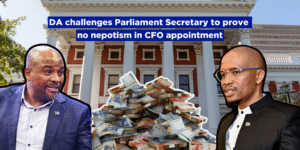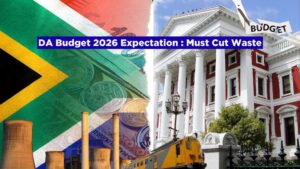The DA has, from the outset, maintained that without some form of financial feasibility studies, the National Health Insurance (NHI) cannot be considered.
This was confirmed by the Minister of Finance, Enoch Gondwana, in his response to our written parliamentary question (PQ) with regards to financing this horrendous bill, given the current fiscal constraints.
He was clear in his response, saying “the cost model will not automatically translate into budget allocations, as these would have to be made as part of the budget process which will take into account the macro-economic environment and fiscal space.”
In recent parliamentary portfolio of health committee meetings, the DA has taken a tough stance on the necessity of a financial model, as well as a meeting with the Finance Minister, to address the concerns. It has become abundantly clear, that such a financial feasibility model does not exist. Yet, the our repeated requests in committee and through letters to the Ministers of Health and Finance and the health and finance committee chairs, for a comprehensive presentation on the funding model and the financial impact of the NHI Bill have fallen on deaf ears.
Given Minister Gondwana response to our PQ and Dr Nicholas Crisp’s, the Deputy Director-General: National Health Insurance (DDG), repeated statements to the media and the portfolio committee that the NHI will be funded through taxes, it remains crucial that the committee receives clarity on the NHI costing and funding.
The Davis Tax Commission, established by former President Jacob Zuma, made it clear that even with increasing personal income tax and VAT, NHI funding would still have a shortfall of millions.
The ANC Government has ignored this report and is determined to push the NHI Bill through Parliament, despite the reservations raised from opposition parties, experts, health stakeholders and the public.
South Africa continues to teeter on a fiscal cliff. The country is overextended on its loans, unemployment has rocketed, fuel and transport costs are astronomical and the huge hike in the cost of living has left the country poorer than ever.
Furthermore, the health sector currently faces R125 billion in medical negligence claims. The poor and vulnerable cannot foot the bill for the failure of this government.
To raise taxes, VAT or put any other financial burden on the perpetually shrinking tax base, who is already suffering due to the current economic crisis – brought on by State capture, cadre deployment, ineptitude, and corruption – will drive South Africans into further poverty.
Public health facilities are a disgrace. Infrastructure is collapsing, there are staff shortages at almost every facility, and there are continual reports of shortages of medical supplies and medicines.
Instead of using their budgets to upgrade facilities and appropriately staff them, the ANC government wants to use the money to establish boards, units and layers of structures in the NHI Bill, which will have no impact on the bad state of the public health system as it stands now and will further exacerbate the myriad and growing problems.
The DA wholeheartedly supports universal health coverage. In effect, South Africa already has universal health care. Had the ANC succeeded in properly managing public health care, there would have been no need or opportunity for the private health to come into being and flourish. The NHI Bill will not solve the problems of the public health sector. Only proper planning, infrastructure management and development, and ridding hospitals of cadre deployment, will ensure that quality universal health care become a reality – especially for the poor and vulnerable. Trying to rob Peter to pay Paul will never be the solution.




